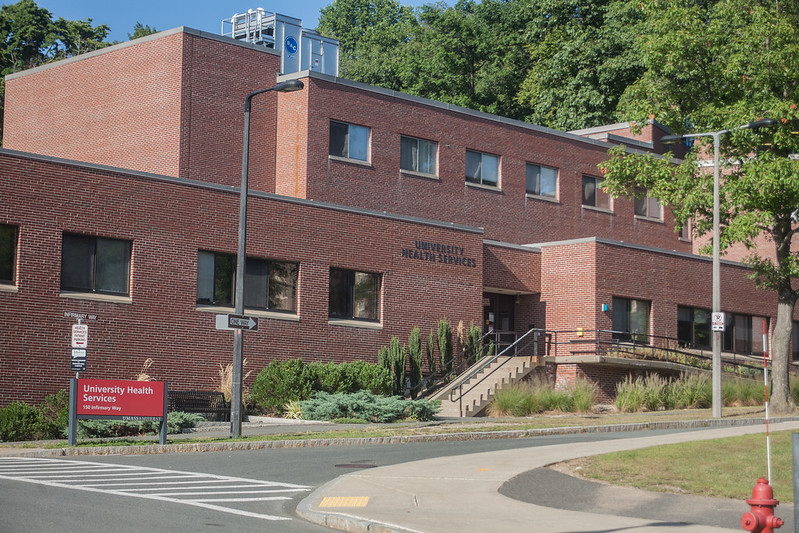Since the pandemic began, University Health Services at the University of Massachusetts has been at the forefront of organized COVID-19 testing for symptomatic students while continuing to offer appointments for general medical concerns.
In March 2020 as Chancellor Kumble Subbaswamy was sending students home amid the news of the novel COVID-19 virus, UHS was playing their part in addressing the ongoing pandemic by setting up their respiratory clinic and adapting to guidelines from the Centers for Disease Control and Prevention that were being set in real time.
“The preparations began around when we went remote, UHS was clearly going to be a site where that was happening because we are the accredited health care center for UMass,” said UHS Communications and Marketing Specialist Sasha Rivera. “It was a very collaborative process from the beginning, the University and UHS and vice versa.”
UHS has since become the testing site for students who are symptomatic of COVID-19, while asymptomatic testing is conducted in the Mullins Center. “I think it took students some time to understand the difference and know where to go for either symptomatic or asymptomatic testing,” Rivera said.
In order to ensure the safety of staff and students alike, UHS began offering services such as the Minute Nurse service which was made in place of their regular walk-in appointments. Students can electronically fill out a form detailing their symptoms and submit it to umass.medicatconnect.com.
“They get a call back from a nurse and either be sent to respiratory or get an appointment for the next day. Their contact with us is just as good as with the walk-in clinic,” Associate Director of Clinic Operations Jeanne Ryan explained.
If UHS staff determines that a student needs to come into the clinic, they are seen at the newly adapted respiratory clinic. “We spent time over the summer really changing the way work was done and [how] patients were seen and safety measures. You’ve probably seen them out in regular life, plexiglass, social distancing, etc,” Ryan said.
“The place that needed the most attention was the designated respiratory clinic or the COVID-19 precautionary clinic,” she added. “We turned our north clinic, which has a separate door from outside, into this respiratory care clinic and that was completely sealed off from any of the other clinics. We installed a negative pressure respiratory air system, which is the best system to deal with air flow.”
Once seen by a nurse at the negative pressure respiratory clinic, the student’s COVID-19 test would then be in the hands of Erin Poulin’s team at the IALS Clinical Testing Center.
“You get a swab yourself, specimens will arrive downstairs, they get logged into a computer system manually by a person,” Poulin, a laoratory manager at the Univeristy said. “That person will then print labels that will help us identify and then the computer can read it. Those samples have to get manually pipetted at UHS into a different container which then goes on an instrument.”
That’s the process for a regular COVID test, which takes an average of 18 hours to get results from. However, that’s not the only option available to students. In emergency cases, UHS also offers a 15-minute rapid test which may yield less accurate results.
“It’s basically the same process, the only difference is it takes a lot more virus in the sample to be detected as compared to using our big, huge machine which is timed to look for those itty-bitty amounts of virus,” Poulin said.
Since the beginning of the pandemic, UHS has run over 4,000 tests.
“There’s a lot of burnout, it’s really hard to keep going flat out all day. You’re answering questions from patients who are like ‘Hey where are my results?’ and the labs not 24/7. They’re putting in 12-hour days some days to get things done and get people results, but you’re still dealing with people’s anxieties and concerns,” Poulin said. “Last I looked, UHS has a turnaround time averaging 18 hours and we’re closed for 14. Most people who get tested in the morning have an answer by the end of the day.”
For the staff at UHS, dealing with COVID-19 is a non-stop battle. “You have to remember that for healthcare staff, they’re experiencing this pandemic 24/7. I would say our staff is hopeful, but fatigued,” Ryan said. “I feel really proud of how stalwart everyone has been about coming in to work, showing up, getting through this together and doing what we have to do.”
Malavika Soni can be reached at [email protected]. Follow her on Twitter @vika_soni.



















